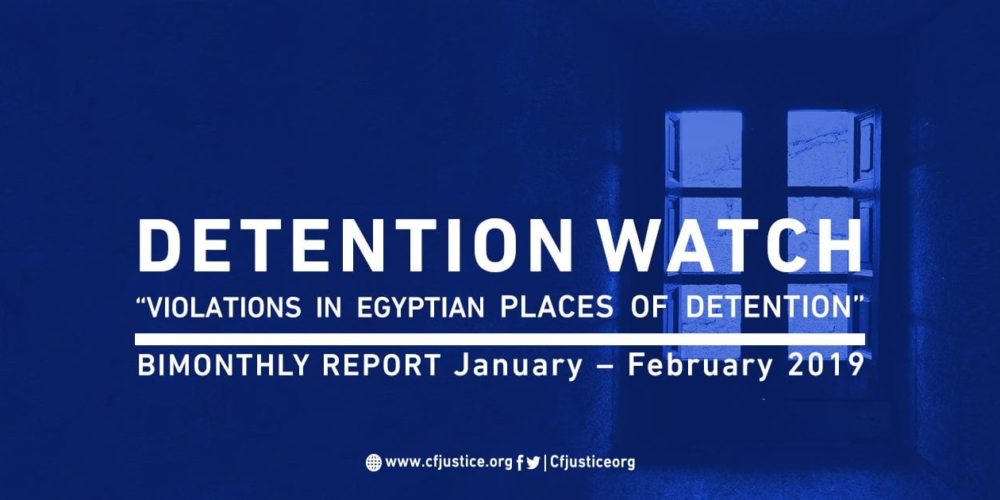425 violations monitored across the two months with extrajudicial killings and arbitrary detentions leading the violations
Sharqia governorate had the biggest number of enforced disappearance incidents:
Committee for Justice issued its report on monitoring Egyptian places of detention – official and nonofficial – covering the months of January and February 2019; amid signs that Egyptian authorities continue to adopt a systematic approach to violations in a way that hasn’t changed since the start of this monitoring project back in 2017.
Detention Watch team monitored 425 violation incidents across the two months, where 247 violations were monitored in January, while 178 violations were monitored in February.
Arbitrary detention was the leading violation observed in January with 132 monitored cases (55.44% of total violations monitored). Enforced disappearance came second with 65 cases (26.31%) followed by extrajudicial killings with 19 cases.
Medical negligence came fourth with 13 monitored cases, then death in custody (7 incidents), torture (7 cases) and finally visits prohibition with 4 monitored incidents.
In February, extrajudicial killing was the leading violation, with 74 monitored deaths (41.57% of total violations monitored), reflecting a remarkable increase compared to January where our team monitored 19 extrajudicial killing incidents.
Arbitrary detention came second with 55 monitored incidents (30.8% of monitored violation), followed by enforced disappearance with 33 cases (18.53%), then torture with 7 incidents, medical negligence with 5 cases, death in custody with 3 deaths and finally visit prohibition with two incidents.
Enforced disappearance maintained the leading position within committed violations, with 65 cases monitored in January 2019, representing 26.31% of the total number of monitored incidents. As of the time of writing the report, only 7 cases had reappeared either in a court trial or in places of detention spread across Egypt (10.76% of forcibly disappeared cases reappeared later).
In February 2019, CFJ team monitored 33 cases of enforced disappearances, of which only 9 appeared later at the time of writing this report, representing 27.27% of the total number of enforced disappearances monitored during the month.
Sharqia governorate remains the governorate with largest number of enforced disappearances in Egypt, recording 27 cases of enforced disappearance, which represent 41.15% of total cases monitored in January. It also maintained its position in February with 8 monitored cases (24.24%), while Behira governorate came second in the two months with 9 cases in January, and 5 monitored cases in February.
Our team monitored 187 cases of arbitrary detention across the two months, of which 132 cases of arbitrary detention took place in January, while February witnessed 55 cases of arbitrary detention.
In January, Behira governorate recorded the highest number of arbitrary detentions with 23 cases representing 17.42% of the total arbitrary detention cases monitored, while Beni Suef had the highest number of arbitrary detentions in February with 20 cases (36.36% of total monitored cases).
Medical negligence continued to threaten the lives of detainees as a tool for slow death. Our team monitored 7 deaths in places of detention in January 2019, 6 of which were due to medical negligence. The team also monitored 13 cases of medical negligence in prisons, while in February the team monitored 3 death incidents in places of detention due to medical negligence as well as 5 cases of medical negligence in prisons.
Torturing of detainees continued, where CFJ monitoring 7 torture incidents against 7 detainees in different places of detention in January beside 6 cases of torture monitored in February 2019.
Committee for justice team continued its efforts in documentation, a procedure that is superior to monitoring, reaching a total of 25 documented violations that took place inside 9 known places of detention in Egypt against 23 detainees.
CFJ documented 8 violation incidents in prisons across January and February 2019, where medical negligence was leading in terms of number of documented violations. Tora reception prison and Tora investigations prison registered the highest number of violations documented during the two months.
According to documented data on 23 detainees, our team found that 21 out of 23 detainees were forcibly disappeared (91.3% of documented cases). During the period of their enforced disappearance ,they were detained in different areas throughout Egypt, which include five different state security headquarters and two police stations. CFJ also documented the torturing of four detainees during their enforced disappearance.
In January and February 2019, Committee for justice documented five cases of medical negligence in places of detention as well as three cases of arbitrary detention that fall under category 2 (arrest and detention due to the practice of legitimate rights such as protesting and freedom of expression) and category 3 (severe violations to the principles of a fair trial) of the categories of the Working Group on Arbitrary Detention.
Committee for Justice affirms the need for Egyptian authorities to take full responsibility for their obligations under the law. CFJ will continue to monitor the current and ongoing reality in places of detention and to enable families of victims and detainees to build documented cases of illegal and inhumane conditions which they have endured.
Committee for justice also stresses on the importance of engaging the Egyptian authorities in a dialogue that can build coherent and consistent strategies and laws aimed at ending such violations and preventing impunity in cases of human rights violations in places of detention.
For this report, after collecting primary data, CFJ team employed the “verification tool”, which is a step that is regrettably overlooked by many other human rights organizations reporting in the same field due to difficulties in establishing contact, time consumption and risks associated. For CFJ, authenticating the data collected is a crucial step to safeguard the credibility of the data presented, and to be able to legally hold the violators accountable with proof.
Skip to PDF content





